2020 山东省青岛市中考英语真题及答案
(考试时间:100 分钟;满分:90 分)
说明:
1. 本试卷分为第 I 卷和第 II 卷两部分,共六大题。第 I 卷包含单项选择、完形填空和阅
读理解,共 40 小题;第 II 卷包含词汇运用 A、B,阅读表达 A、B 和书面表达。
2. 所有题目均在【点答题卡】上作答,在试题上作答无效。
第 I 卷
I. 单项选择
从每小题所给的四个选项中选出最佳选项。
1.What ________ unusual school trip we had! I will never forget it.
A. a
B. an
C. the
D. /
2.You'd better not hang out after school ________ telling your parents. They may
worry about you.
A. by
B. with
C. without
D. after
3.Li Lei didn't play computer games last weekend. ________, he worked as a volunteer
in an old people's home.
A. Instead
B. Certainly
C. Though
D.
Gradually
4.Please remember to ________ the electricity and water before you leave the
laboratory.
A. take off
B. shut off
C. go off
D. put
off
5.—Is this hat ________?
—No, the red one is ________.
A. Lucy's; her
B. Lucy; her
C. Lucy's; hers
D. Lucy;
hers
6.Teachers expect all their students ________ progress day by day.
A. to make
B. make
C. to take
D. take
�
7.In Chinese families, people won't start dinner ________ the elders take their
seats.
A. after
B. when
C. because
D. until
8.My People, My Country is ________ movie I've ever seen.
A. more educational
B. the most educationalC. educational
D. less
educational
9.—Allen, shall we go to the bookstore this afternoon?
— I'm sorry, David, but I ________ meet my cousin at the train station.
A. have to
B. can
C. may
D. could
10.— Lily, could you tell me ________?
—About ten minutes.
A. how far is it from your home to school
B. how far it is from your home to
school
C. how long does it take you to walk to school D. how long it takes you to walk to
school
II. 完形填空
阅读下面短文,掌握其大意,从 A、B、C、D 四个选项中选出最佳选项。
My life was perfect when I was twelve years old. I had a big family, ___11___
my sister, Chrissy, and a little brother, Patrick, whom I loved greatly. Spring
was coming, and I was ___12___ about another summer with Grandma. She and I had
great fun together last summer. She was retiring (退休) this year, ___13___ that
meant more time with her. Then, on April 11, 2017, at 10:00 P.M., we were all going
to bed when the phone rang. My uncle was ___14___ to say that Grandpa had just taken
Grandma to the hospital.
The next morning I was told that Grandma was gone due to a heart disease. I
tried to be strong, but even my father ___15___. I hadn't even said goodbye to her.
I couldn't control my ___16___ anymore and began to cry loudly. It finally hit me:
She was gone ___17___. All she had left me were ___18___ in the garden — the hours
�
we spent planting flowers and taking care of ___19___. I believe that my grandma
is a star watching over me, and she would have wanted me to be ___20___ and happy
like her, even though there are bad times. My family and friends love me for who
I am and support me for what I do, as I know my grandma would, too.
11. A. besides
B. including
C. except
D. beside
12. A. worried
B. excited
C. moved
D.
surprised
13. A. but
B. while
C. so
14. A. calling
B. visiting
C. helping
writing
15. A. shouted
B. spoke
16. A. thoughts
B. words
C. talked
C. ideas
feelings
17. A. ever
B. forever
C. always
sometimes
18. A. instructions
B. suggestions
C. memories
experiments
D. or
D.
D. cried
D.
D.
D.
19. A. them
B. her
C. it
D. us
20. A. weak
B. careful
C. polite
D. strong
III. 阅读理解
阅读下列短文,做出正误判断或选出最佳选项。A 篇为判断正(A)误(B)题,B、C 篇为选择
题,D 篇为六选五补全短文。
A
China National Film Museum
Forbidden City and the Palace Museum
9 Nanying Road, Chaoyang District,
4 Jiangshanqian Street, Dongcheng District,
Beijing
Beijing
Tel: (010)8435
5959
Tel: (010) 8500 7421/7420
Open: 9:00-16:30 except Mon. www.
Open: 8:30-17:00, Apr. 1-Oct. 31;
�
cnfm. org. cn
8:30-16:30, Nov. 1- Mar. 31
Gift shop with legitimate DVDs/
Closed on Mon. afternoon except public
cafeteria/snack shops (popcorn for
holidays and summer vacation (July 1-Aug. 31)
movie viewing)
www. dpm. org. cn
Gift shop/ book shop/ museum guide
available/restaurant/ coffee shop/shops and
cafes
National Museum of China
National Art Museum of China
16 East Changan Street, Dongcheng District,
1 Wusida Street, Dongcheng District,
Beijing
Beijing
Tel: (010)6511 6188
Tel: (010) 6400 1467
Open: 9:00-17:00 except Mon., ticket box
Open: 9:00-17:00, last entry 16:00
closed at 15:30
www. namoc. org
www. chnmuseum. cn
Cafeteriaatthebackofthebuilding
Gift shop/audio guide
21. You can visit the China National Film Museum on Tuesday.
22. If you want to learn more about films, you can call (010) 6400 1467.
23. You can visit the Forbidden City and the Palace Museum on Monday in summer
vacation.
24. You can enter the National Museum of China at 17:30.
25. The four museums are in the same district of Beijing.
B
�
Wild beavers (河狸) are back! Experts say that the wild beaver families are
doing well. The beavers are even boosting wildlife and the environment!
Over ten years ago, a family of beavers turned up in a part of the river Otter,
in Devon. No one knew exactly where they came from. It was a big surprise, wild
beavers hadn't lived in England for around 400 years!
In 2015, the government allowed the beavers to stay there as part of a trial
(试验). They wanted to see if these animals could be reintroduced to the wild. The
trial ends in February. Some scientists from the University of Exeter already say
the beavers help the wildlife in the area. One scientist called it "an amazing
story".
A lot of this is because of dams. Beavers build dams along the river. This creates
deep pools in the riverbed and slows the water down. Scientists say this is perfect
for many different types of plants and animals! Many plants are growing near the
beavers. Different types of animals are also becoming more and more in the river.
Beavers also help make flooding less, scientists say. The beavers' dams slow down
the speed of the river, especially after heavy rain.
There are, however, some problems. Beavers gnaw (咬,啃)on trees and this can
harm them. Their dams can also sometimes create floods (洪水) on people's land.
Beavers aren't the only animals that are being reintroduced to the wild! In
2019, red squirrels were brought back to an area of the Scottish Highlands. Further
away, the world's rarest (罕见的) duck, the Madagascar pochard, is making a comeback.
It was set free into the wild on the African island in 2019 and is doing well.
Who knows what other animals might be making a comeback?
26. Which of the following best explains "boosting" in paragraph 1?
A. building
B. spreading
C. helping
D.
�
creating
27. Why did the government want a trial first? Because they wanted to ________.
A. grow more plants along the river
B. build dams for the beavers in the wild
C. introduce the beavers to the wild
D. see if the beavers could be reintroduced to the wild
28. What are the good things about wild beavers living on the river Otter?
A. They help plants grow and make flooding less.
B. They bring heavy rain and
floods.
C. They gnaw on trees and harm them.
D. Their dams create floods on
people's land.
29. How many kinds of animals are mentioned in the news story which have been
reintroduced to the wild?
A. One.
B. Two.
C. Three.
D. Four.
30. How do you think animal lovers feel about the news?
A. Embarrassed.
B. Pleased.
C. Tired.
D.
Disappointed.
C
Part of Earth's beauty comes from its oceans. Ocean scientists study the
chemical make-up of the ocean, weather patterns, the geography of the ocean floor,
and many other areas. Their work is exciting, although sometimes dangerous. Using
technology to do certain tasks helps. For example, robotic arms are used for very
dangerous tasks.
One basic part of ocean study is understanding waves and how they work. Wind
is the great maker of waves. The waves we know are mostly produced by winds blowing
over the sea. They are directly connected with the wind speed and the time that
wind lasts.
�
Sometimes ocean life can be seen in the wave. Living things seem to be staying
within the wave, moving slowly inside it as if they were weightless. Besides the
beauty of waves, scientists are interested in their technical ways. The diagram
of waves shows how scientists examine waves. Waves are measured (测量) from the
top (crest) to the bottom (trough). This allows scientists to find out the height
of a wave. They also measure waves from crest to crest to determine (测定) the length
of a wave.
During serious storms, huge waves might cut a sea ship apart. Ships are at great
risk of winding up as broken pieces after being hit by the force of a huge wave.
By understanding the ocean, scientists can prevent this breakup of ships by
predicting when the water will be too dangerous for people and their ships. The
study of waves and the ocean also allows scientists to make sure how certain beaches
were formed. By studying the oceans, a great deal can be learned about the surface
we live on.
31. Why are robotic arms used? Because ________.
A. certain tasks are very dangerous
B. the tasks are exciting
C. the oceans are beautiful
D. there are many studying areas
32. What can we learn from the second paragraph?
A. Waves can make wind.
B. Most waves are produced by
winds.
C. Scientists make most waves.
D. Waves have nothing to do with
wind.
33. What is the meaning of "the length of a wave" according to paragraph 3?
A. The beauty of huge waves.
B. The technical way to study the sea.
�
C. The distance from crest to crest of a wave.
D. The distance from the top to the bottom of a wave.
34. Which of the following statements are right according to the passage?
① Scientists can decide the weather patterns.
②We can't find living things in the waves.
③By studying the ocean, scientists can prevent the breakup of ships.
④The study of waves helps scientists know how certain beaches were formed.
A. ①③
B. ②④
C. ③④
D. ②③
35. Where is the passage probably from?
A. A diary entry.
B. A fairy tale.
C. A travel guide.
D. A
science magazine.
D
根据短文内容,从选项中选出能填入文中空白处的最佳选项,选项中有一项为多余选项。
You've been learning words since you were a tiny baby. At first, you learned
them only by hearing other people talk. Now that you're a reader, you have another
way to learn words. What should you do when you come to a word and you think you
don't know what it means? ___36___.
Say it
First sound it out. Then say it to yourself. ___37___. Sometimes you know a
word in your head but you don't know what it looks like in print. So if you match
up what you know and what you read - you have the word!
Use context
If this doesn't work, take the next step: look at the context — the other words
and sentences around it. Read this sentence: When it rained, the dog looked for
shelter in the doorway. ___38___. Rain and in the doorway might give you helpful
information.
___39___
If the context doesn't help, look at the parts of the word. Does it have any
�
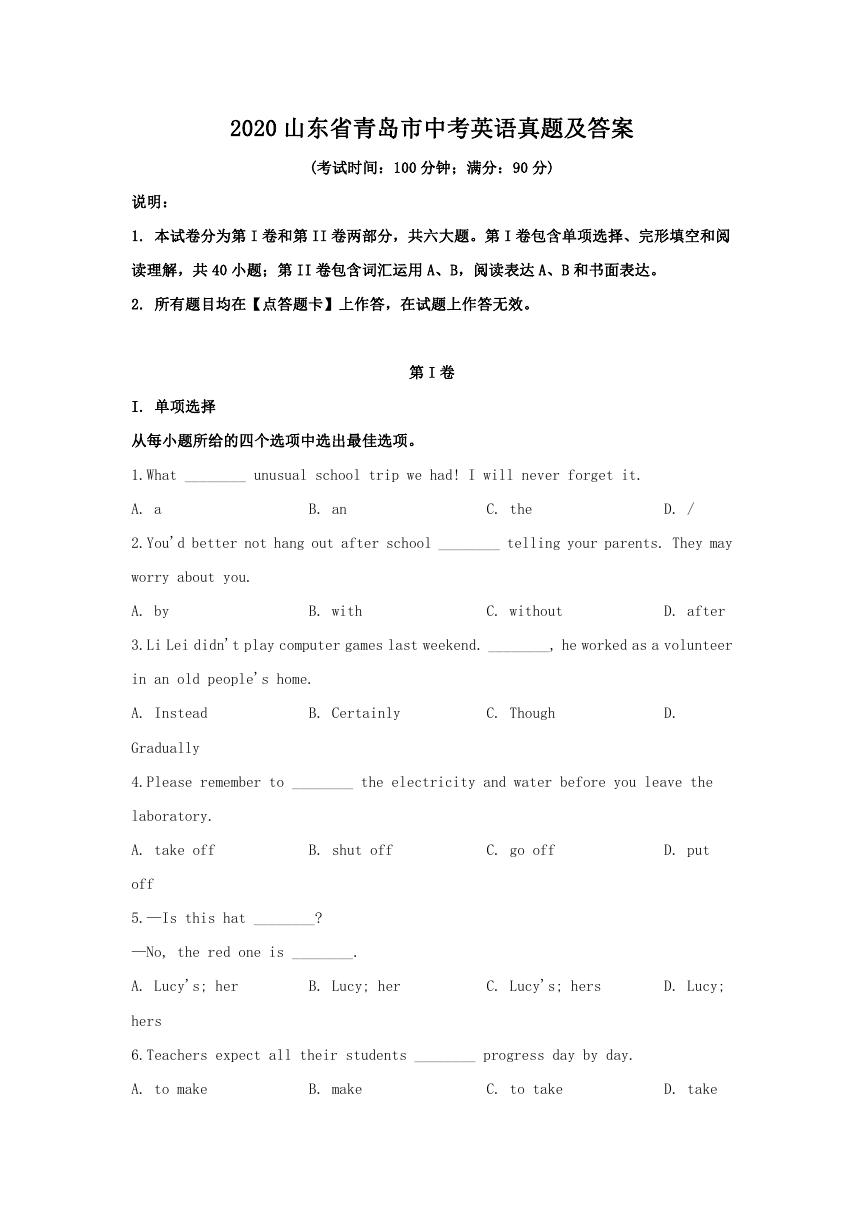
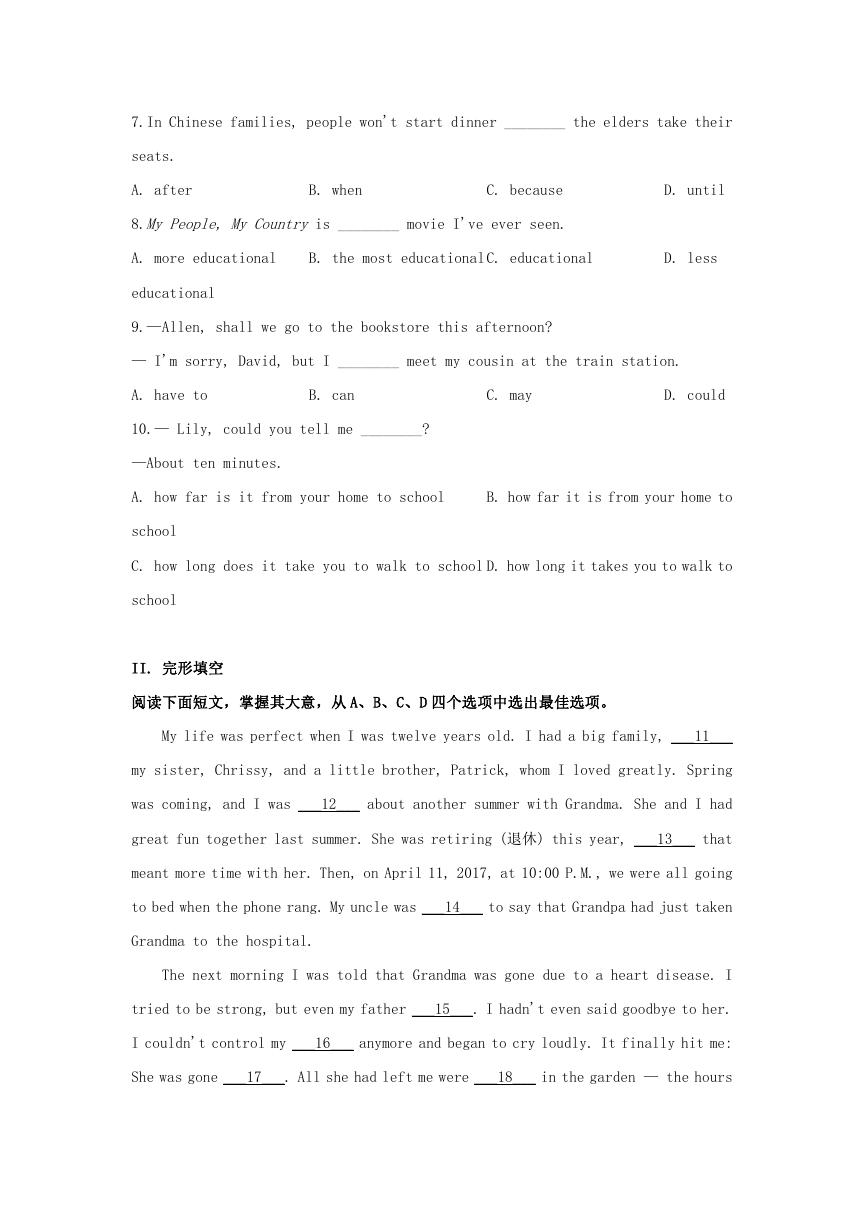
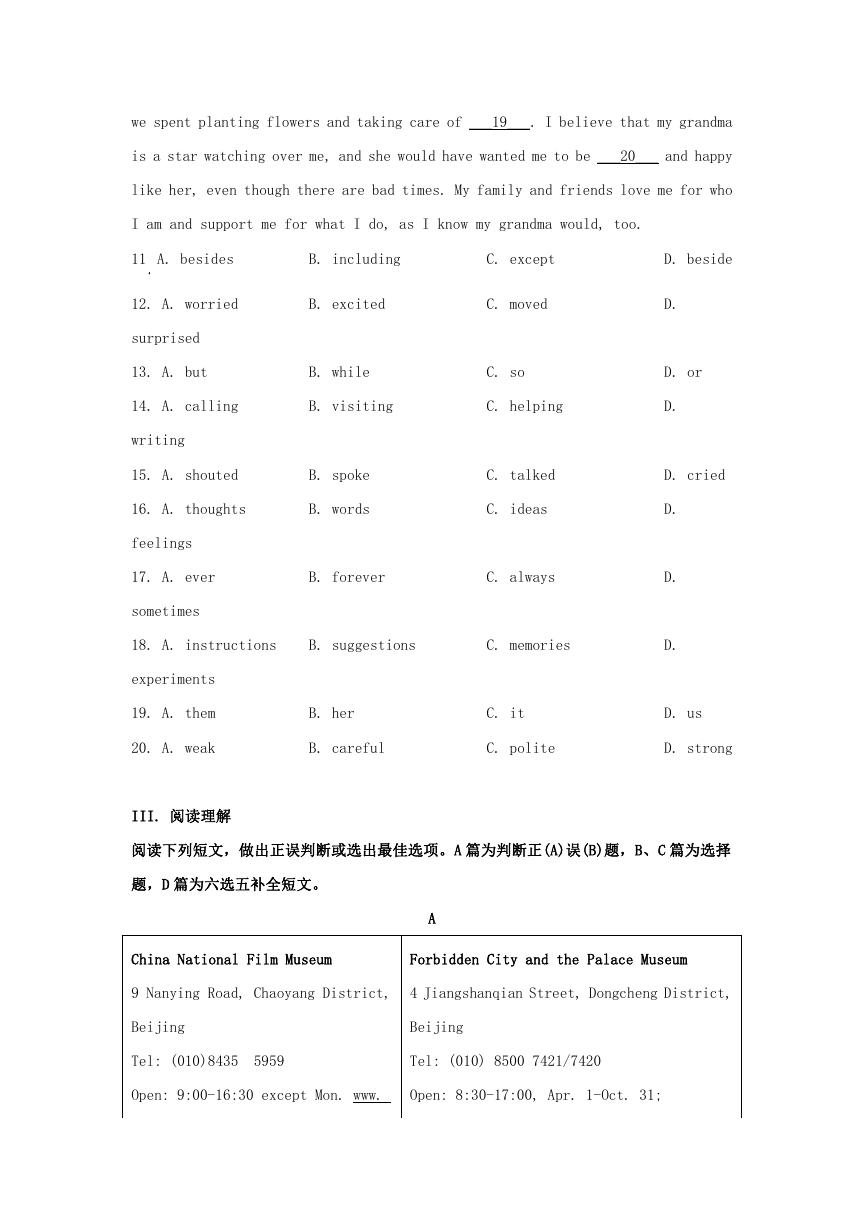
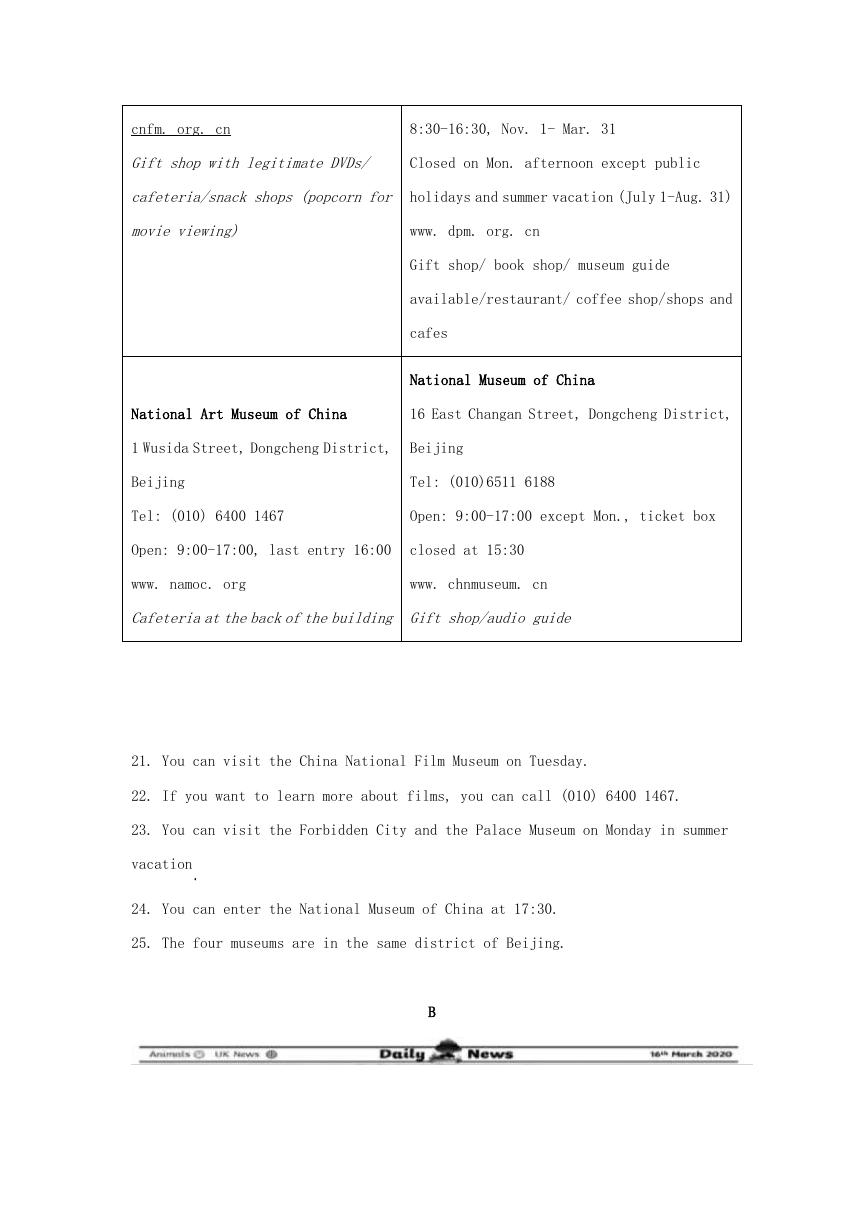
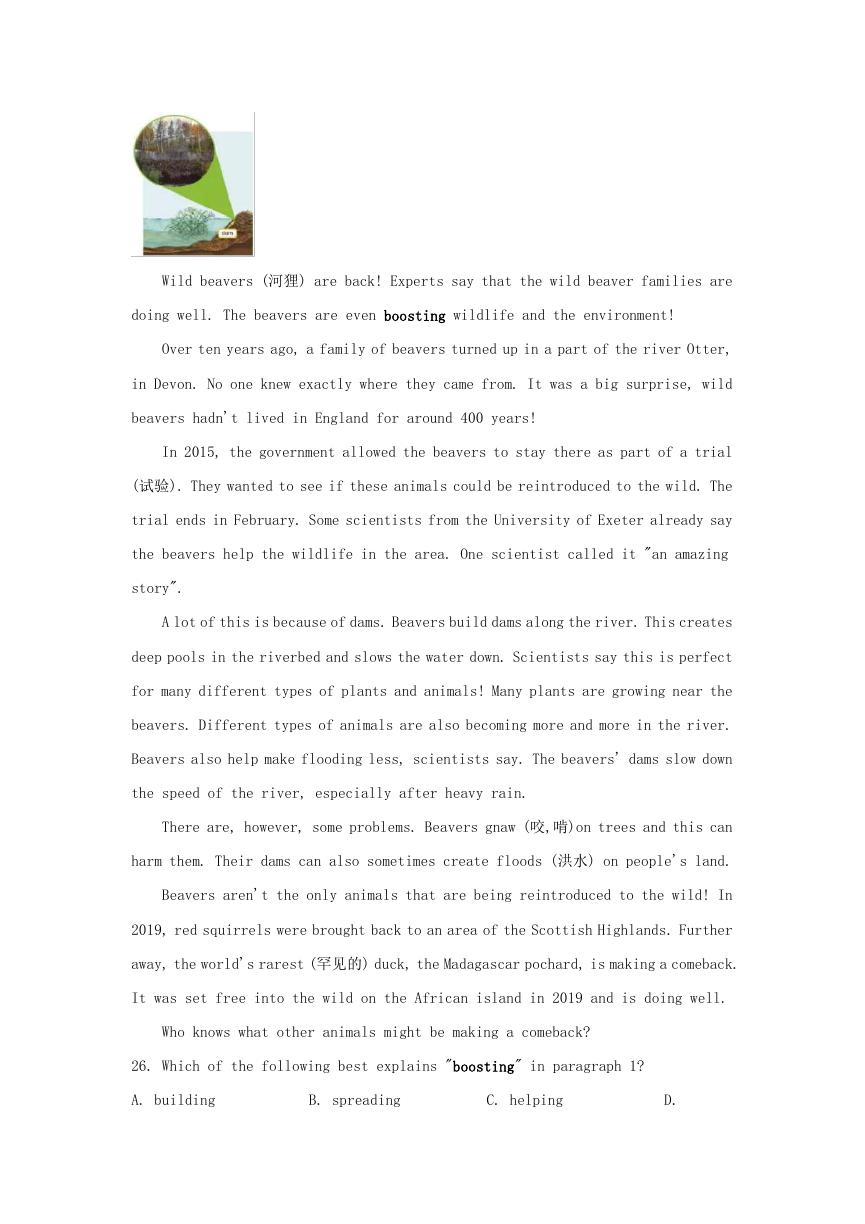
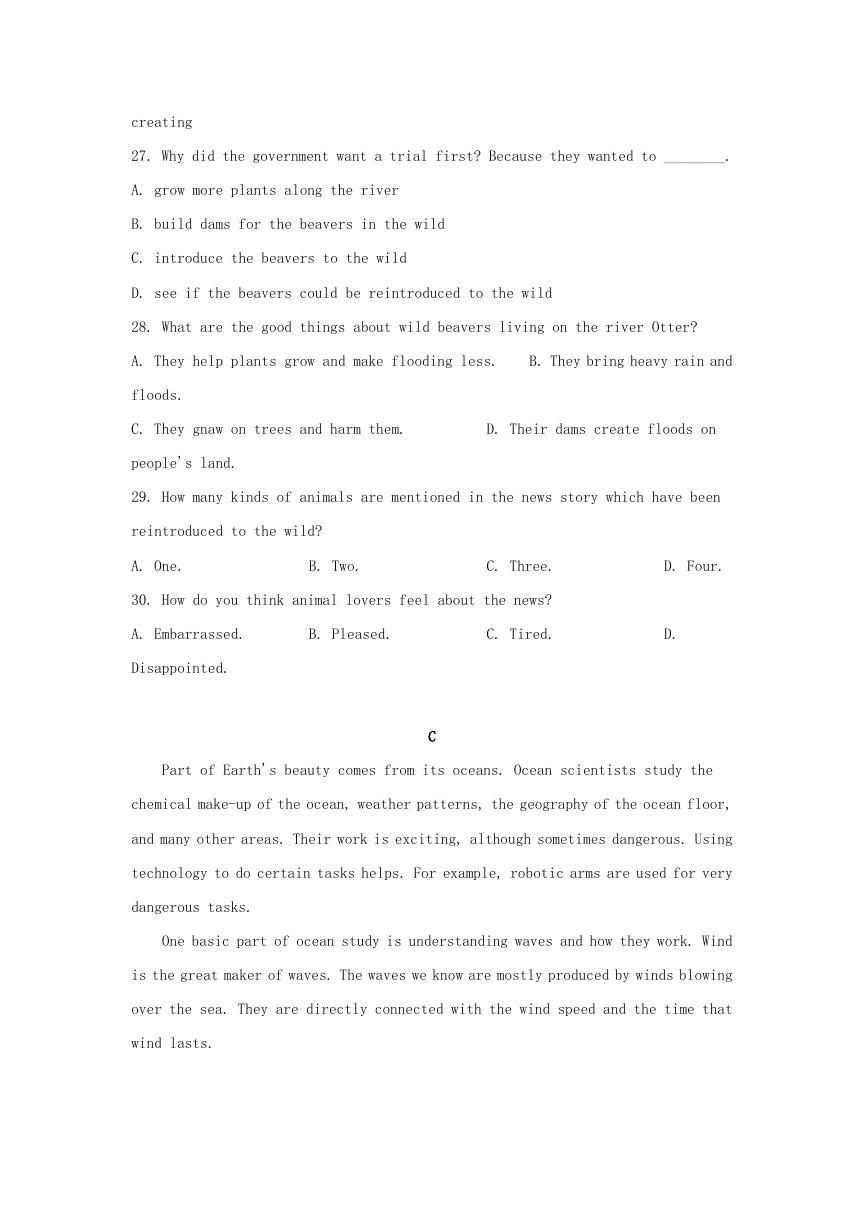
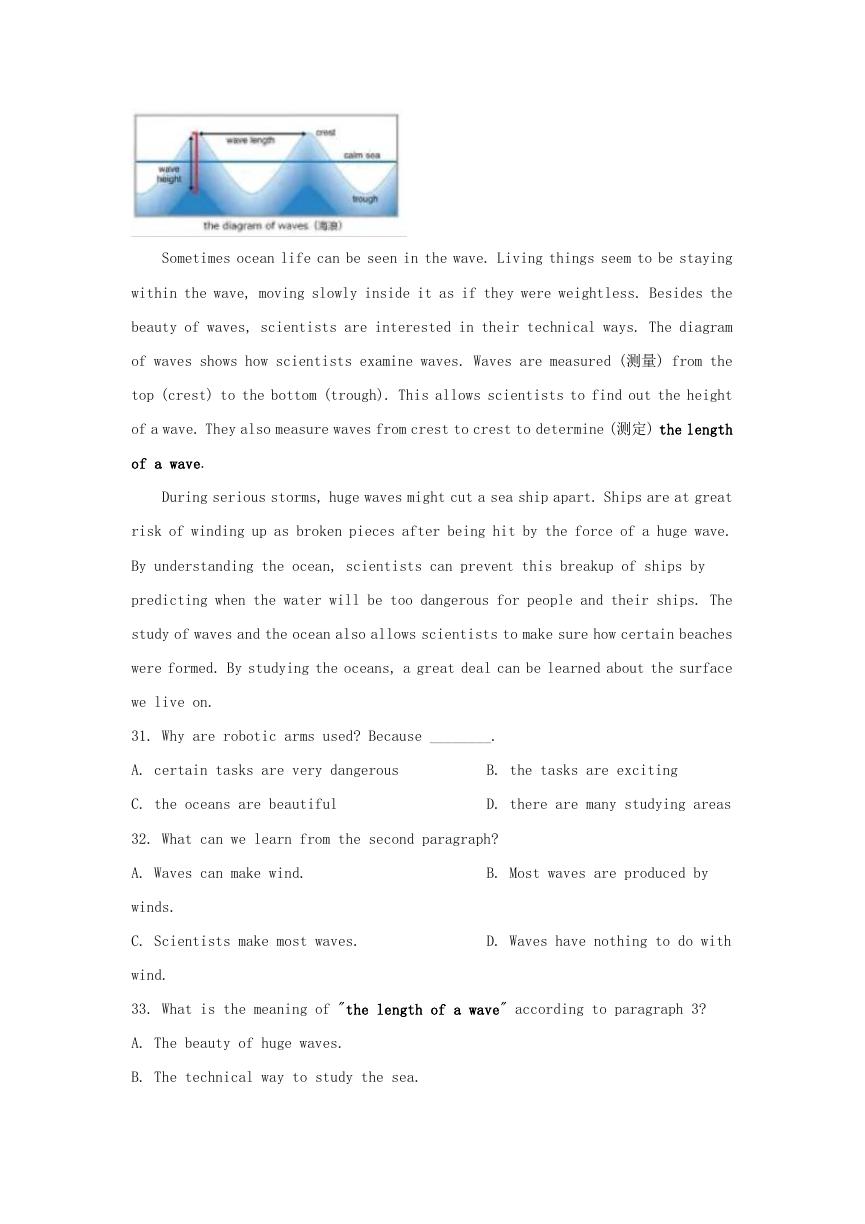
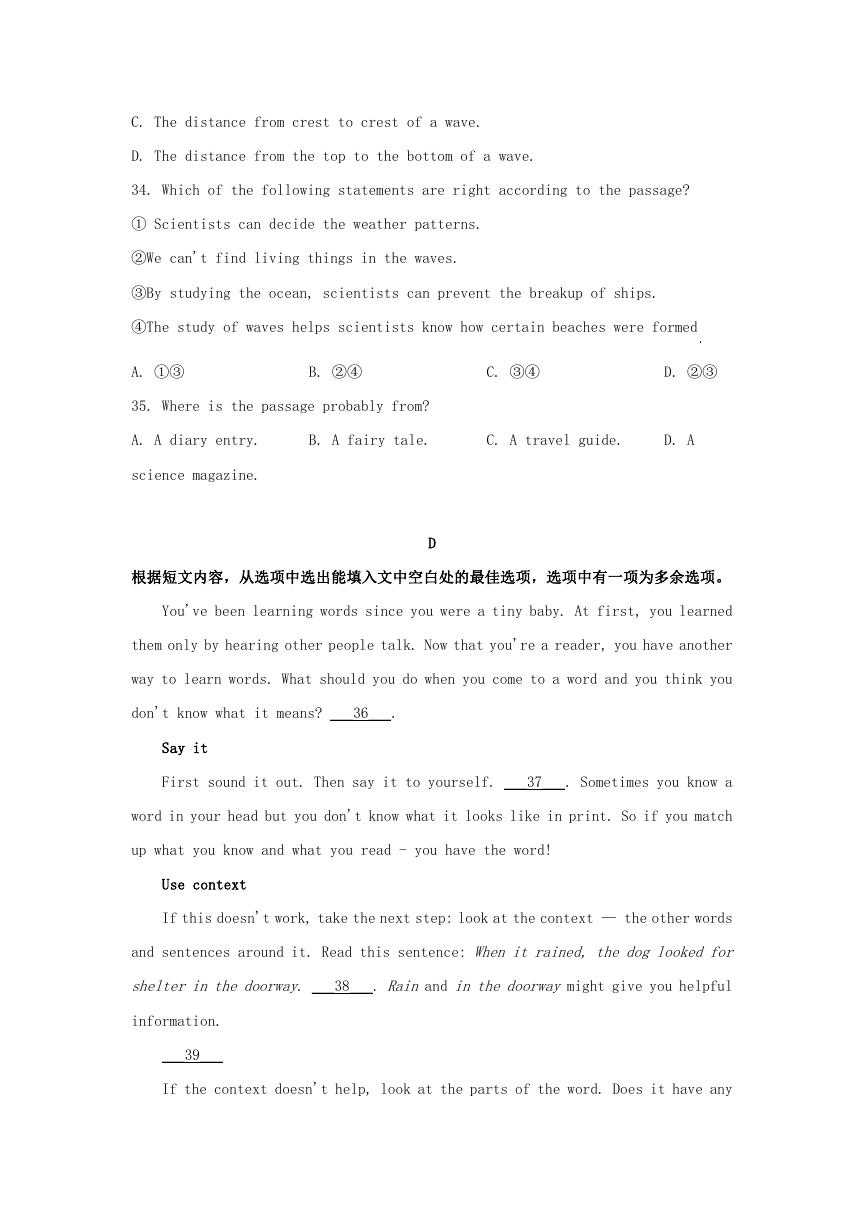








 2023年江西萍乡中考道德与法治真题及答案.doc
2023年江西萍乡中考道德与法治真题及答案.doc 2012年重庆南川中考生物真题及答案.doc
2012年重庆南川中考生物真题及答案.doc 2013年江西师范大学地理学综合及文艺理论基础考研真题.doc
2013年江西师范大学地理学综合及文艺理论基础考研真题.doc 2020年四川甘孜小升初语文真题及答案I卷.doc
2020年四川甘孜小升初语文真题及答案I卷.doc 2020年注册岩土工程师专业基础考试真题及答案.doc
2020年注册岩土工程师专业基础考试真题及答案.doc 2023-2024学年福建省厦门市九年级上学期数学月考试题及答案.doc
2023-2024学年福建省厦门市九年级上学期数学月考试题及答案.doc 2021-2022学年辽宁省沈阳市大东区九年级上学期语文期末试题及答案.doc
2021-2022学年辽宁省沈阳市大东区九年级上学期语文期末试题及答案.doc 2022-2023学年北京东城区初三第一学期物理期末试卷及答案.doc
2022-2023学年北京东城区初三第一学期物理期末试卷及答案.doc 2018上半年江西教师资格初中地理学科知识与教学能力真题及答案.doc
2018上半年江西教师资格初中地理学科知识与教学能力真题及答案.doc 2012年河北国家公务员申论考试真题及答案-省级.doc
2012年河北国家公务员申论考试真题及答案-省级.doc 2020-2021学年江苏省扬州市江都区邵樊片九年级上学期数学第一次质量检测试题及答案.doc
2020-2021学年江苏省扬州市江都区邵樊片九年级上学期数学第一次质量检测试题及答案.doc 2022下半年黑龙江教师资格证中学综合素质真题及答案.doc
2022下半年黑龙江教师资格证中学综合素质真题及答案.doc